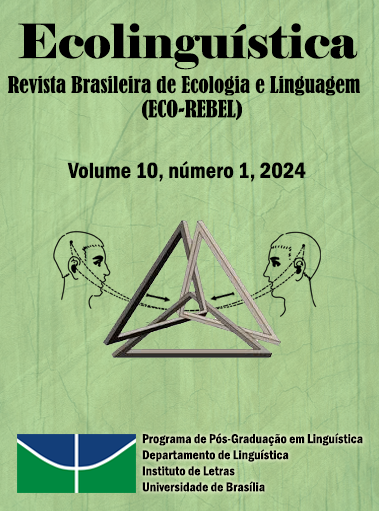Os verbos frasais ingleses e o potencial referencial da língua
Keywords:
Verbos frasais; enriquecimento do vocabulário; poder referencial-comunicativo; inglês língua franca internacional; Linguística Ecossistêmica..Abstract
Este artigo tem dois objetivos principais. O primeiro é discutir os chamados phrasal verbs da língua inglesa, salientando que eles se compõem basicamente de uma partícula de natureza preposicional ou adverbial, que, por isso mesmo tem base espacial, como sói acontecer com as preposições em geral. Sigo a proposta de Lakof & Johnson (1980), de acordo com a qual “em cima” (up) é “bom, desejável” e “embaixo” (under) é “ruim, não desejável”, o que se dá também com “à frente” (in front of) preferível a “atrás” (in back of). O segundo objetivo é mostrar que a estratégia de formar novo verbo pelo acréscimo de uma partícula a uma base verbal é apenas um dos inúmeros recursos que o inglês tem para enriquecer seu vocabulário. Entre as outras estratégias para se formarem novas palavras contam-se as abreviações (ad, van, fan), siglas (radar, laser, aka) e composições (laptop, notebook, deadline), além do uso de recursos oriundos do latim. Tudo isso aumenta consideravelmente o poder referencial-comunicativo do inglês, o que facilitou, juntamente com o poder dos países anglófonos, a transformação do inglês em língua franca internacional. O arcabouço teórico que constitui o pano de fundo da investigação é a Linguística Ecossistêmica.
Downloads
Published
Issue
Section
License

This work is licensed under a Creative Commons Attribution-NonCommercial-NoDerivatives 4.0 International License.
Authors who publish in this journal agree to the following terms:
Authors retain copyright and grant the journal the right of first publication. The work is simultaneously licensed under the Creative Commons Attribution License allowing the sharing of the work with acknowledgment of the authorship of the work and initial publication in this journal.
Authors are authorized to enter into additional contracts separately for non-exclusive distribution of the version of the work published in this journal (e.g., publishing in institutional repositories or as book chapters), with acknowledgment of authorship and initial publication in this journal.
Authors are allowed and encouraged to post and distribute their work online (e.g., in institutional repositories or on their personal page) at any point before or during the editorial process, as this can bring about productive revisions as well as increase impact.
Citation of published works (See The Effect of Free Access).



3.png)



